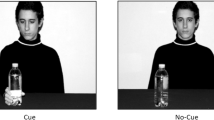Abstract
An individual's social competence is often considered in terms of his role-taking abilities. In the light of studies by Piaget, it has been supposed that a child's developing capacity to appreciate the viewpoints of others in a social context is reflected in his ability to recognize points of view in a visuospatial setting. If this is valid, then visuospatial role-taking tasks may afford a measure of some relatively “cognitive” component of the capacity to engage in social behavior. Tasks in which subjects were required to make judgments about different and yet related views of a three-dimensional scene or object, together with tests of operational thinking, were presented to normal children and to subjects with the diagnosis of infantile autism. The results indicate that autistic children are no more impaired in their recognition of visuospatial perspectives than are normal children of comparable intellectual level in tests of operational thinking. A further, more limited study yielded suggestive evidence that over this series of tasks, autistic children perform as well as subjects with Down's syndrome who have a similar verbal mental age. These findings render it improbable that autistic children are especially “egocentric” in their appreciation of visuospatial perspectives.
Similar content being viewed by others
References
Anthony, E. J. (1958). An experimental approach to the psychopathology of childhood: Autism.British Journal of Medical Psychology, 31, 211–225.
Borke, H. (1975). Piaget's mountains revisited: Changes in the egocentric landscape.Developmental Psychology, 11(2), 240–243.
Dewey, M. A., & Everard, M. P. (1974). The near-normal autistic adolescent.Journal of Autism and Childhood Schizophrenia, 4, 348–356.
Donaldson, M. (1978).Children's minds. London: Fontana/Collins.
Flavell, J. H. (1974). The development of inferences about others. In T. Mischel, (Ed.),Understanding other persons. Oxford: Basil Blackwell.
Flavell, J. H., Botkin, P. T., Fry, C. L., Wright, J. W., & Jarvis, P. E. (1968).The development of role-taking and communication skills in children. New York: Wiley.
Hermelin, B. (1978). Images and language. In M. Rutter, & E. Schopler (Eds.),Autism: A reappraisal of concepts and treatment (pp. 141–154). New York: Plenum Press.
Hermelin, B., & O'Connor, N. (1970).Psychological experiments with autistic children. Oxford: Pergamon Press.
Hobson, R. P. (1980). The question of egocentrism: The young child's competence in the coordination of perspectives.Journal of Child Psychology and Psychiatry, 21(4), 325–331.
Hobson, R. P. (1982). The question of childhood egocentrism: The coordination of perspectives in relation to operational thinking.Journal of Child Psychology and Psychiatry, 23(1), 43–60.
Kanner, L. (1943). Autistic disturbances of affective contact.Nervous Child, 2, 217–250.
Laurendeau, M., & Pinard, A. (1970).The development of the concept of space in the child. New York: I.U.P.
Pastovic, J. J., & Guthrie, G. M. (1951). Some evidence on the validity of the WISC.Journal of Consulting Psychology, 15, 385–386.
Piaget, J. (1926).The language and thought of the child (M. Gabain, Trans.). London: Routledge and Kegan Paul.
Piaget, J. (1952).The child's conception of number (C. Gattegno & F. M. Hodgson, Trans.). London: Routledge and Kegan Paul.
Piaget, J., & Inhelder, B. (1956).The child's conception of space (F. J. Langdon, & E. L. Lunzer, Trans.). London: Routledge and Kegan Paul.
Piaget, J., & Inhelder, B. (1969).The psychology of the child (H. Weaver, Trans.). London: Routledge and Kegan Paul.
Rose, S. A., & Blank, M. (1974). The potency of context in children's cognition: An illustration through conservation.Child Development, 45, 499–502.
Rutter, M. (1970). Autistic children: Infancy to adulthood.Seminars in Psychiatry, 2(4), 435–450.
Rutter, M. (1974). The development of infantile autism.Psychological Medicine, 4, 147–163.
Rutter, M. (1978). Language disorder and infantile autism. In M. Rutter & E. Schopler (Eds.),Autism: A reappraisal of concepts and treatment (pp. 85–104). New York: Plenum Press.
Shantz, C. U. (1975). The development of social cognition. In E. M. Hetherington (Ed.),Review of child development research (Vol 5). Chicago: University of Chicago Press.
Author information
Authors and Affiliations
Additional information
The present research was undertaken in partial fulfillment of a Ph.D. degree at the Institute of Psychiatry, University of London. Some of the tasks were originally devised in collaboration with David Mant in the course of undergraduate work at Cambridge University. I am indebted to the subjects who took part in the study and to the teaching staff who helped me, particularly Mrs. Wendy Brown, Mrs. Elizabeth Kelleher, and the staff at the Helen Alisson School for Autistic Children, Gravesend. I am grateful to Dr. Beate Hermelin, Professor Michael Rutter, and Dr. Peter Clark for their encouragement and advice, and to Ms. Maria Callias and Dr. Richard Cromer for their helpful criticisms.
Rights and permissions
About this article
Cite this article
Hobson, R.P. Early childhood autism and the question of egocentrism. J Autism Dev Disord 14, 85–104 (1984). https://doi.org/10.1007/BF02408558
Issue Date:
DOI: https://doi.org/10.1007/BF02408558




